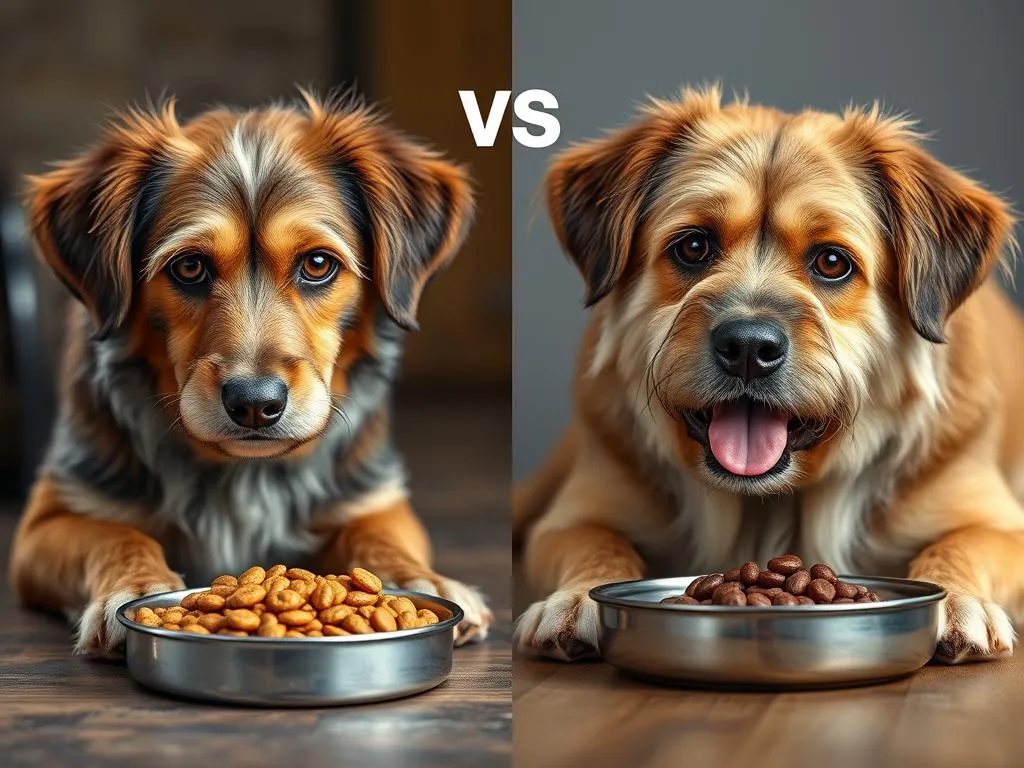
Understanding the differences between senior dog food and regular dog food is crucial for pet owners who want to ensure their furry companions maintain a healthy lifestyle as they age. Senior dogs have unique nutritional needs that differ significantly from those of their younger counterparts. This article delves into the specifics of dog nutrition, comparing senior dog food to regular dog food and providing valuable insights for pet owners.
Understanding Senior Dogs
Definition of Senior Dogs
Typically, dogs are considered seniors when they reach the age of 7 years or older. However, this classification can vary based on breed and size. For example, larger breeds may age faster than smaller breeds. Senior dogs often experience a range of physical and behavioral changes, such as reduced energy levels, joint stiffness, and changes in metabolism. Understanding these changes is essential for selecting the right nutrition to support their health.
Nutritional Needs of Senior Dogs
As dogs age, their metabolism slows down, which impacts their nutritional requirements. Senior dogs often face challenges in digestion and nutrient absorption, making it essential to adjust their diets accordingly. Here are some key nutritional needs for senior dogs:
-
Decreased Metabolism: Senior dogs generally require fewer calories than their younger counterparts due to a slower metabolism. Overfeeding can lead to obesity, which poses additional health risks.
-
Changes in Digestion and Absorption: Aging can affect the digestive system’s efficiency, necessitating a diet that is easier to digest and absorb.
-
Increased Need for Specific Nutrients: Senior dogs benefit from added nutrients like Omega-3 fatty acids for joint health and antioxidants to combat oxidative stress. These nutrients help support overall health and longevity.
Nutritional Comparison: Senior Dog Food vs Regular Dog Food
Key Nutrient Differences
When comparing senior dog food vs regular, several crucial nutrient differences come into play:
-
Protein Content: Senior dogs require high-quality protein to maintain muscle mass. Regular dog food may contain lower quality protein sources or insufficient amounts, which can be detrimental to a senior dog’s health.
-
Fat Content: Many senior dog foods have lower fat content to help with weight management, while still providing enough energy for their daily activities. Regular dog food may not take this into account.
-
Fiber Levels: Increased fiber is essential for digestive health in senior dogs. Senior dog food often contains higher fiber levels to aid in digestion and prevent constipation.
Ingredient Quality
The quality of ingredients in dog food is vital, especially as dogs age. Senior dog food often prioritizes whole food sources over fillers. Common ingredients found in senior dog food include:
-
Glucosamine and Chondroitin: These ingredients are crucial for joint health and mobility, helping to prevent arthritis and promote better movement.
-
Whole Grains and Vegetables: Ingredients like brown rice, sweet potatoes, and peas provide essential vitamins and minerals.
-
Natural Preservatives: High-quality senior dog foods avoid artificial preservatives, opting for natural alternatives that are safer for older dogs.
Caloric Density
Understanding caloric density is essential when comparing senior dog food to regular dog food. Senior dogs generally require fewer calories due to their slower metabolism, making it crucial to monitor their caloric intake closely. Overweight senior dogs can face numerous health issues, including diabetes and joint problems. Selecting a senior dog food that is specifically formulated to meet their caloric needs is vital for maintaining a healthy weight.
Health Benefits of Senior Dog Food
Joint Health and Mobility
One of the primary benefits of feeding senior dogs specialized food is the support it provides for joint health and mobility. Ingredients such as glucosamine and chondroitin play a significant role in maintaining joint function, reducing inflammation, and alleviating pain. Proper nutrition can help senior dogs remain active and engaged in their daily lives, enhancing their overall quality of life.
Cognitive Function
As dogs age, cognitive decline can become a concern. Nutrients that support brain health, such as antioxidants and DHA (an Omega-3 fatty acid), are essential for preventing cognitive decline. Senior dog food often includes these nutrients, which can help maintain mental sharpness and improve overall brain function.
Digestive Health
Digestive issues are common in senior dogs. The inclusion of probiotics and prebiotics in senior dog food aids in maintaining a healthy gut flora, promoting better digestion and nutrient absorption. This is particularly important for senior dogs, who may have more sensitive digestive systems. Senior dog food can help manage common digestive problems, ensuring your dog remains comfortable and healthy.
Choosing the Right Dog Food
Factors to Consider
When selecting dog food, especially for senior dogs, several factors should be taken into account:
-
Dog’s Age, Size, Breed, and Health Conditions: Different breeds and sizes have varying nutritional requirements. Consult with a veterinarian to determine the best diet based on your dog’s specific needs.
-
Consultation with a Veterinarian: Always consult your veterinarian before making significant changes to your dog’s diet. They can provide personalized recommendations based on your dog’s health and lifestyle.
Reading Labels
Understanding ingredient lists and nutritional information on dog food labels is crucial. Look for:
-
Quality Ingredients: Ensure the first few ingredients are high-quality protein sources and whole foods.
-
Nutritional Adequacy Statement: This indicates that the food meets the standards set by the Association of American Feed Control Officials (AAFCO).
-
Brand Reputation: Research brands that specialize in senior dog food and have positive reviews from other pet owners.
Transitioning to Senior Dog Food
Transitioning your dog from regular to senior dog food requires care to avoid digestive upset. Follow these tips for a smooth transition:
-
Gradual Introduction: Start by mixing a small amount of senior food with regular food and gradually increase the proportion of senior food over a week or two.
-
Monitor Your Dog’s Response: Watch for any signs of discomfort or digestive issues during the transition. If issues arise, consult your veterinarian.
Common Myths and Misconceptions
“All Dogs Age the Same Way”
It’s a common belief that all dogs age at the same rate, but this is not true. Aging varies significantly based on breed and size. Larger breeds tend to age faster than smaller breeds, so their nutritional needs may change earlier.
“Regular Dog Food is Just as Good”
Another prevalent misconception is that regular dog food is just as effective as senior dog food. This is false; senior dog food is specifically formulated to meet the unique needs of aging dogs, providing essential nutrients that regular dog food may lack.
Frequently Asked Questions (FAQs)
How can I tell if my dog needs senior food?
Signs that your dog may need senior food include weight gain, decreased energy levels, joint stiffness, or changes in appetite. If your dog is over 7 years old and exhibiting any of these signs, it may be time to consider transitioning to senior dog food.
Can I mix senior dog food with regular dog food?
Yes, but it’s essential to do so carefully. Gradually introduce senior dog food to your dog’s regular food to prevent digestive upset. Monitor your dog’s response and consult your veterinarian for advice.
What are the signs of poor nutrition in senior dogs?
Signs of poor nutrition in senior dogs can include excessive weight loss or gain, dull coat, poor dental health, lethargy, and digestive issues. If you notice any of these signs, it may be time to reassess your dog’s diet and consult with a veterinarian.
Conclusion
Choosing the right food for senior dogs is crucial for their health and well-being. Understanding the differences between senior dog food and regular dog food enables pet owners to make informed decisions that can significantly impact their dog’s quality of life. By prioritizing proper nutrition, pet owners can help their senior dogs maintain a healthy, active lifestyle well into their golden years. Always consult with professionals to ensure your dog receives the best care possible.









